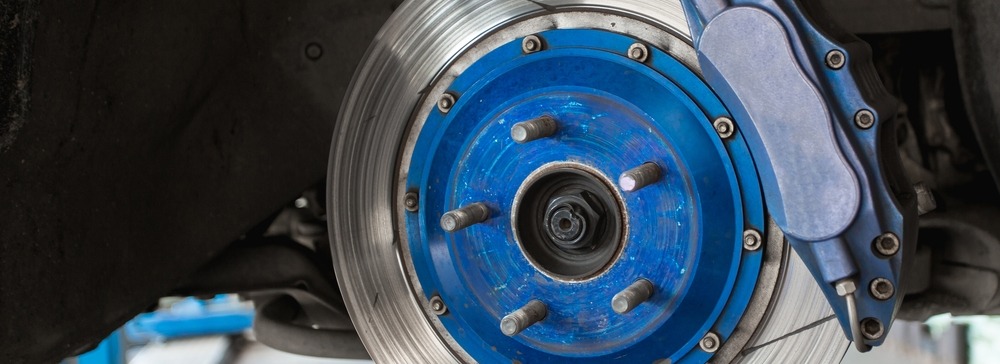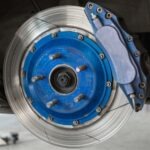
20 May Disc Brakes System: What Are The Common Issues & Repairs
 As responsible vehicle owners, it is our job to ensure that our automobiles are safe to drive, perform economically, and adhere to the industry’s standards. A vehicle’s braking system requires service to maintain the disc brakes’ integrity, including replacing worn brake pads and old brake fluid. Keep reading for more insights on your vehicle’s disc brake system and service suggestions.
As responsible vehicle owners, it is our job to ensure that our automobiles are safe to drive, perform economically, and adhere to the industry’s standards. A vehicle’s braking system requires service to maintain the disc brakes’ integrity, including replacing worn brake pads and old brake fluid. Keep reading for more insights on your vehicle’s disc brake system and service suggestions.
Brief History: Auto Braking System
In 1898, Elmer Ambrose Sperry was the first to design an electric car equipped with front-wheel disc brakes. In 1902, an English engineer named William Lanchester patented a disc brake design. While his invention was groundbreaking, it also produced an ear-damaging screeching noise caused by the copper brake linings pressing against the metal disc. It took until 1908 for Herbert Frood to solve the excessive noise issue by lining the metal brake pads with an asbestos compound, which was used in car brakes for over 75 years. Disc brakes exploded in popularity in the 1950s when vehicles became significantly heavier and faster, making hydraulic brakes less efficient.
How Disc Brakes Work
An automotive disc braking system involves many components to slow down and stop your vehicle in any weather, temperature, or environment. When a motorist engages the brake pedal, the pressurized brake fluid pushes the brake pad against the rotor, creating friction. This friction slows the wheel rotation, thus causing your vehicle to slow down and stop.
Disc Brakes System Components
Disc brakes are reliable, safe, and standard equipment in most modern automobiles. Here’s a list of the basic components found in a disc braking system:
- Brake fluid
- Brake caliper
- Brake pads
- Disc or Rotors
- Master cylinder
- Pistons
Common Disc Brakes Issues
Your vehicle’s braking system is a vital safety feature and requires timely service. A qualified auto technician can quickly and easily identify and repair or replace your auto’s disc brakes. Let’s review some common warning signs associated with disc brake issues.
Worn Brake Pads
Your vehicle’s brake pads are consumable and wear down over time. Auto manufacturers generally recommend brake inspections every six months. Read your owner’s manual and discuss your needs with your auto technician. Schedule a service appointment immediately if you detect any of these symptoms of worn brake pads.
- Metal scraping noise while braking
- Squeaking, squealing, or chirping sounds when not braking
- The brake pedal presses down further before engaging
- A shaking brake pedal or steering wheel while slowing down or stopping
- It takes longer to stop your vehicle
- An illuminated ABS, Brake, or Traction Control warning light on the dashboard
Low or Old Brake Fluid
Brake fluid contains glycol, a hygroscopic fluid that absorbs water, so follow the manufacturer’s suggested service interval closely. Contaminated old brake fluid cannot maintain optimal performance parameters. Additionally, low brake fluid levels can also cause unsafe stopping conditions. Be aware of the following signs that require a brake fluid inspection and service appointment:
- Spongy feeling brakes
- Burning smell when braking hard
- An illuminated ABS or Brake System warning light
- The brake pedal pushes to the floorboard before engaging
4 Common Disc Brake Repairs
The braking system is rather complicated, especially on newer cars, with many moving parts and consumable components. As noted above, it’s pretty easy to spot when your brakes need work, but it’s not always easy to know which parts need servicing or replacing. Let’s break it down and look at 4 common brake repairs.
1. Replace Worn Brake Pads
Brake pads are one of the components that wear down every time you apply the brakes. They work in pairs on each wheel, are attached to the calipers, and squeeze against the disc (or rotor), creating friction to slow down your car. When you apply the brakes, one of the first signs that your brake pads are wearing thin is a squealing or screeching sound. The pad has completely worn down if the screeching sound has progressed to grinding. It is now damaging the rotor with metal-on-metal friction.
Brake Pads Life Span
A brake pad’s life span depends on its composition materials (metallic or organic compounds, ceramic, or other composite elements). Your driving style, road conditions, weather, and terrain can also significantly impact how long they last. Typically, brake pads last 20,000 – 70,000 miles. Consult your owner’s manual and service technician to estimate your car’s brake pad lifespan.
2. Resurface Rotors
The rotors are metal discs that rotate while the wheels are moving. The brake pads are pushed against the rotors by the calipers to slow down the car. This action creates friction and extreme heat that can scar and warp the rotors over time. If the rotors have become damaged, you may notice vibrations in the brake pedal or the steering wheel when using the brakes. If the rotor damage is not too severe, the technician can resurface them. But, if routine maintenance has been ignored or put off for too long, the rotors may need to be replaced.
3. Faulty Master Cylinder
The master cylinder is a hydraulic pump that moves pressurized brake fluid from the brake pedal to various pistons and finally to the braking components at the wheels. If the master cylinder is faulty, you may notice a mushy feeling brake pedal or may go to the floor before engaging. Another sign of master cylinder issues is leaking brake fluid. If you find golden-yellow to dark-brown spots under your car or the brake warning light is lit up on your dashboard, schedule brake service immediately.
4. Low or Leaking Brake Fluid
Getting your brake fluid inspected regularly is one of the most important services to have performed on your car. The entire braking system depends on the quality and quantity of your brake fluid. Burned or old brake fluid no longer provides adequate lubrication and cooling properties to your braking components. Compromised fluid can cause excessive wear and result in expensive replacements. If your vehicle leaks brake fluid, the pressure is compromised, and you may experience intermittent braking issues. Leaking brake fluid may also create air bubbles or allow other contaminants into the line, which can compromise the safety of your car. A brake fluid flush involves:
- Draining all the brake fluid from the system.
- Refilling it with fresh brake fluid.
- Bleeding all the air out of the entire system.
Braking System Maintenance Intervals
Following the factory-suggested maintenance interval as outlined in your owner’s manual can help prolong the life of your vehicle. It also helps reduce expensive repairs and replacements by addressing minor brake system concerns before they become major issues. Depending on your automobile model, driving style, and terrain, have your braking system inspected at least once a year or as often as every 4-6 months/5,000-10,000 miles.
Disc Brake Service & Repairs in Jacksonville, FL
Even if you like to tinker with your car at home, it’s best to schedule an appointment with a professional when it comes to major safety systems (like the braking system). The trained auto technicians at JJ’s Auto Care will perform your vehicle’s disc brake inspection, replace worn brake pads, and exchange old brake fluid. You can expect quality replacement parts and reasonable rates at JJ’s Auto Care.
Schedule Your Disc Brakes Service
Contact us today at (904) 721-6646 or online to request a disc brake appointment.

